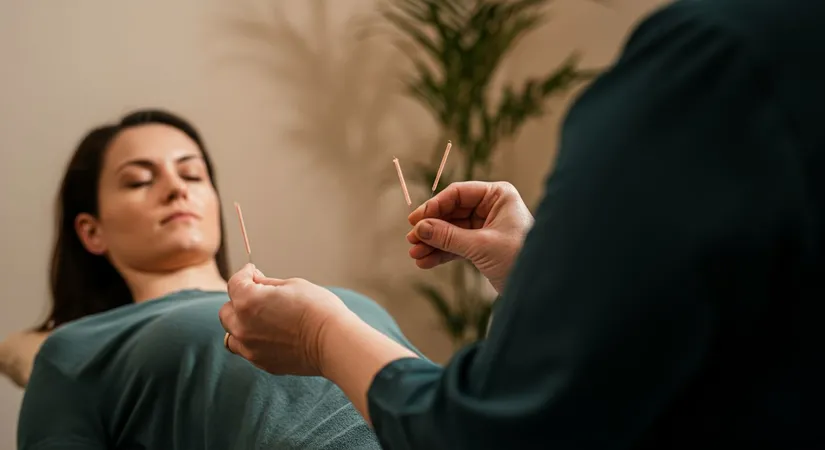Discover the Healing Power of Acupuncture and Natural Therapies
Explore eastern medicine near you and embark on a path to holistic healing. Unlock wellness with Traditional Chinese Medicine and acupuncture therapy.
In the fast-paced world we live in today, many individuals are finding solace in the ancient practices of eastern medicine. For those searching for "eastern medicine near me", it's essential to understand the underlying principles and benefits of this holistic approach to health. Eastern medicine encompasses a range of healing practices that originated in Asia, primarily Traditional Chinese Medicine (TCM), acupuncture, herbal remedies, and more. It is based on concepts of continuous harmony and balance of the human body. As we delve into this guide, explore how these time-honored treatments can complement modern lifestyles, improve wellness, and offer alternative solutions for various health challenges.
Exploring the Benefits of Traditional Chinese Medicine
Understanding the Core Principles of TCM
Traditional Chinese Medicine (TCM) is deeply rooted in the philosophy of balancing Yin and Yang, which are considered the fundamental forces of the universe. This balance is crucial for maintaining health and preventing disease. TCM practitioners focus on the flow of Qi, or vital energy, which is believed to circulate through pathways in the body known as meridians.
One of the unique aspects of TCM is its holistic approach to health. Unlike Western medicine, which often targets specific symptoms, TCM aims to address the root cause of an ailment. This is achieved through various methods, including herbal remedies, acupuncture, and dietary adjustments. For example, a person suffering from migraines might be treated with a combination of acupuncture therapy and specific herbs to restore balance and alleviate pain.
Key Components of TCM Practices
- Herbal Remedies: Utilizes natural plants and minerals to treat various conditions.
- Acupuncture: Involves inserting thin needles into specific points to enhance Qi flow.
- Dietary Therapy: Focuses on food choices that support balance and health.
Studies have shown that TCM can effectively manage stress and improve immune function. For instance, acupuncture therapy has been found to reduce stress levels significantly, promoting relaxation and mental clarity. Additionally, TCM's emphasis on prevention encourages individuals to adopt healthier lifestyle choices, such as regular exercise and a balanced diet, which contribute to long-term well-being.
Steps to Integrate TCM into Daily Life
- Consult a qualified TCM practitioner to assess your health needs.
- Incorporate recommended herbal remedies and dietary changes.
- Schedule regular acupuncture sessions to maintain balance and health.
By understanding and applying the principles of TCM, individuals can experience a holistic approach to health that not only addresses existing conditions but also fosters a proactive stance on wellness. This ancient practice continues to offer valuable insights and methods for achieving a balanced and healthy life.

How Acupuncture Therapy Can Enhance Your Well-being
The Science Behind Acupuncture's Effectiveness
Acupuncture therapy, a cornerstone of eastern medicine, is gaining recognition for its ability to enhance well-being by addressing both physical and emotional health. This practice involves inserting fine needles into specific body points to balance the flow of Qi through meridians, which are pathways believed to influence overall health.
Research indicates that acupuncture stimulates the nervous system, leading to the release of endorphins, the body's natural painkillers. This mechanism helps alleviate chronic pain and reduce anxiety levels. For instance, a study found that patients undergoing acupuncture reported a significant decrease in migraine frequency compared to those receiving conventional treatments.
Unique Benefits of Acupuncture Therapy
- Chronic Pain Relief: Acupuncture has been shown to be as effective as medication for conditions like back pain and arthritis.
- Emotional Balance: It can help manage stress and anxiety by promoting relaxation and mental clarity.
- Improved Sleep: Acupuncture therapy can enhance sleep quality, making it a viable alternative for insomnia treatment.
Beyond pain management, acupuncture is also explored for its potential in treating infertility. Some studies suggest that it may improve reproductive health by enhancing blood flow to the reproductive organs and balancing hormones. This holistic approach is increasingly sought after by individuals looking for natural solutions to complex health issues.
Steps to Experience Acupuncture Therapy
- Research and find a certified acupuncture therapist in your area.
- Schedule an initial consultation to discuss your health concerns and goals.
- Commit to a series of sessions to experience the full benefits of the therapy.
As acupuncture therapy continues to gain popularity, its integration into mainstream healthcare highlights a shift towards more holistic and personalized treatment options. By understanding how acupuncture works and its potential benefits, individuals can make informed decisions about incorporating this ancient practice into their wellness routines.

Finding the Best Eastern Medicine Practitioners Near You
Evaluating Practitioner Credentials and Expertise
When searching for "eastern medicine near me," it's crucial to evaluate the credentials and expertise of practitioners. This ensures you receive quality care tailored to your needs. A practitioner with extensive training in traditional Chinese medicine can offer a comprehensive approach, integrating techniques like acupuncture therapy and herbal remedies.
Consider practitioners who have a proven track record in the field. For example, those with certifications from recognized institutions or associations demonstrate a commitment to maintaining high standards. Additionally, years of practice can indicate a depth of experience in handling diverse health issues.
Key Factors to Consider When Choosing a Practitioner
- Verify Credentials: Ensure the practitioner has valid certifications and licenses.
- Check Reviews: Look for positive patient feedback and testimonials.
- Assess Compatibility: Choose someone whose health philosophy aligns with yours.
Engaging in consultations is another effective way to assess a practitioner's approach. During these sessions, discuss your health goals and observe how well the practitioner listens and responds to your concerns. This interaction can provide insight into their ability to offer personalized care.
- Research online for "best eastern medicine practitioners near me" to find local options.
- Schedule initial consultations to discuss your health needs and expectations.
- Evaluate the practitioner's approach and decide if it aligns with your health goals.
By carefully selecting a qualified practitioner, you can embark on a journey towards holistic healing, benefiting from the rich traditions of eastern medicine. This thoughtful approach ensures that your health and well-being are in capable hands, paving the way for a balanced and fulfilling life.
Understanding What Eastern Medicine Truly Is
The Holistic Approach of Eastern Medicine
Eastern medicine emphasizes a holistic approach, integrating physical, emotional, and spiritual health. This practice contrasts with Western medicine's focus on treating specific diseases. By fostering balance, eastern medicine aims to prevent health issues before they arise.
Practices such as acupuncture, herbal medicine, and Tai Chi are central to this approach. For instance, acupuncture therapy is used not only for pain relief but also to enhance emotional well-being by balancing the body's energy flow. Similarly, herbal remedies are tailored to individual needs, addressing both physical symptoms and underlying imbalances.
Core Practices in Eastern Medicine
- Acupuncture: Balances energy flow to improve physical and emotional health.
- Herbal Medicine: Uses natural ingredients to treat and prevent ailments.
- Tai Chi: Combines movement and meditation to enhance overall wellness.
Eastern medicine's focus on holistic healing is gaining global traction as people seek comprehensive health solutions. This approach not only addresses current health issues but also promotes sustained well-being by encouraging lifestyle changes that support balance and harmony.
- Explore various eastern medicine practices to find what suits your needs.
- Consult with practitioners to understand how these practices can benefit you.
- Incorporate these practices into your routine for long-term health benefits.
As interest in holistic healing grows, understanding the principles and practices of eastern medicine becomes increasingly important. This knowledge empowers individuals to make informed decisions about their health, embracing a balanced and proactive approach to wellness.
Integrating Traditional Chinese Medicine for Holistic Health
Finding Qualified Eastern Medicine Practitioners for Personalized Care
Frequently Asked Questions
What are the benefits of Traditional Chinese Medicine?
How does acupuncture therapy work?
How can I find the best eastern medicine practitioners near me?
What is the process of integrating Traditional Chinese Medicine into daily life?
What are the core practices of eastern medicine?
Discover the Path to 'Healthy Beauty' with estethica's Expert Care!
📞 Call Now for Your Free Consultation!